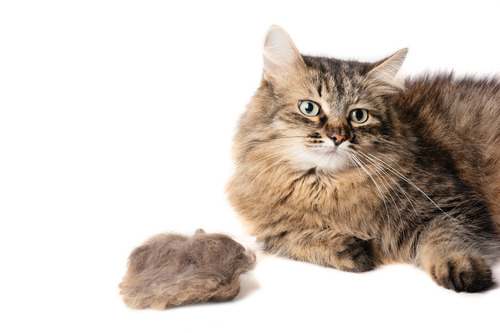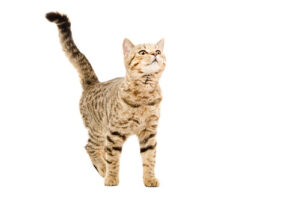Hairballs are an all-too-familiar sight for many cat owners. One minute your cat is grooming, the next they’re hunched over, producing a mess that’s not only unpleasant to clean up but may leave you wondering if something more serious is going on. While the occasional hairball might not be a reason to worry, frequent occurrences could signal a larger issue that’s worth addressing. Below, we’ll take a closer look at the causes of cat hairballs, what’s considered normal, and when it’s time to contact your veterinarian. If you have concerns about your cat’s grooming habits or digestive health, Harlingen Veterinary Clinic in Belle Mead, New Jersey is here to help. Call (908) 359-2000 or book an appointment online today.
What Exactly Is a Cat Hairball?
Hairballs, also known as trichobezoars, form when your cat grooms themselves and swallows loose hair. Because cats have barbed tongues, loose fur often ends up in their digestive tract. Most of the time, this hair passes through their system and exits in their stool. However, when too much hair accumulates, it can clump together in the stomach, resulting in a hairball. Hairballs are typically cylindrical in shape, since they pass through the esophagus during vomiting. Despite the name, they’re often more tube-like than round. A typical cat hairball may also include bits of undigested food or bile, making the sight even more unsettling for pet owners.
Are Cat Hairballs Normal or a Cause for Concern?
An occasional cat hairball—especially in long-haired breeds—is usually nothing to worry about. Most cats will vomit up a hairball every few weeks, particularly during seasonal shedding. However, frequent hairball episodes or signs of discomfort may indicate an underlying issue.
When It’s Probably Normal
- Your cat vomits a hairball once every week or two.
- Hairballs appear during heavy shedding seasons.
- Your cat otherwise eats, drinks, and behaves normally.
Signs Your Cat’s Hairballs Aren’t Normal
- Hairballs appear more than once a week.
- Your cat seems to gag, retch, or cough repeatedly without producing a hairball.
- There are changes in your cat’s appetite, activity level, or litter box habits.
- You see evidence of constipation or diarrhea.
- Your cat appears lethargic or uncomfortable.
If you’re noticing these signs, it’s time to speak with your veterinarian. Hairballs can sometimes lead to digestive blockages, especially in cats with chronic grooming habits or certain underlying conditions.
What Causes Frequent Cat Hairballs?
While grooming is the primary reason cats ingest hair, several factors can lead to an increase in hairball formation. Understanding these can help you address the issue early and reduce your cat’s discomfort.
Breed and Coat Type
Long-haired cats, such as Persians and Maine Coons, naturally shed more hair and require more grooming. As a result, they’re more prone to hairball formation than short-haired breeds.
Grooming Habits
Cats that groom excessively—either due to anxiety, allergies, or skin conditions—tend to swallow more hair than usual. Overgrooming not only increases hairball risk but can also lead to bald patches or skin irritation.
Age and Activity Level
Older cats may be more susceptible to hairballs due to reduced gastrointestinal motility. Less active cats may also be more prone, as exercise can aid digestion and help move hair through the digestive tract.
The Risks of Untreated Hairball Issues
While hairballs themselves are usually harmless, complications can occur if the hair doesn’t pass through the digestive system or get vomited up. In these cases, the hair can form a blockage, which may require veterinary attention.
Potential Complications
- Gastrointestinal obstruction: If a hairball gets stuck, it can block the stomach or intestines, requiring surgery.
- Chronic vomiting: Repeated attempts to expel hairballs may lead to inflammation of the stomach lining.
- Malnutrition: Digestive issues caused by hairballs can affect your cat’s ability to absorb nutrients.
Any time your cat shows signs of distress—such as persistent vomiting, appetite loss, or straining in the litter box—it’s best to consult your veterinarian for a full evaluation.
How Veterinarians Can Help Manage Cat Hairballs
If your cat is dealing with frequent hairballs, your veterinarian can assess the situation and recommend steps to reduce the problem. During an exam, they may check for digestive issues, skin allergies, or behavioral triggers like stress that could contribute to overgrooming.
Diagnostic Testing
To rule out underlying health issues, your veterinarian may suggest:
- Physical examination
- Fecal analysis
- Bloodwork or imaging if a blockage is suspected
Professional Recommendations
Your vet may recommend dietary changes, stress reduction strategies, or medications that help move hair through the digestive tract more efficiently. In more serious cases, surgical intervention may be necessary to remove a blockage caused by a hairball.
Ways to Minimize Cat Hairballs at Home
While veterinary support is important for frequent or severe hairball problems, there are everyday steps you can take to reduce the likelihood of hairball development.
Brush Regularly
Routine brushing helps remove loose hair before your cat can ingest it. For long-haired cats, daily brushing can significantly cut down on hairballs. Short-haired cats benefit from weekly grooming sessions, especially during shedding seasons.
Encourage Hydration
Staying hydrated supports healthy digestion and helps hair move through the GI tract. Offer fresh water daily and consider adding wet food to your cat’s diet to increase moisture intake.
Enrichment and Play
Interactive play sessions help reduce stress and provide healthy distractions from excessive grooming. Cats who are mentally stimulated tend to groom less compulsively.
When It’s Time to Contact Harlingen Veterinary Clinic
If you’re seeing more hairballs than usual or your cat seems uncomfortable, it’s time to speak with a veterinary professional. Frequent vomiting, decreased appetite, or changes in behavior could point to a problem that needs medical attention. The team at Harlingen Veterinary Clinic in Belle Mead, New Jersey is here to support your cat’s health and comfort. Call (908) 359-2000 or book an appointment online today—we’re happy to help.





